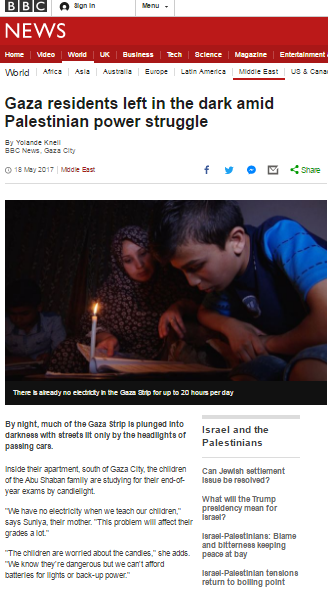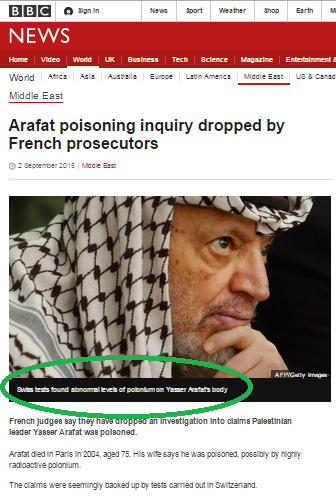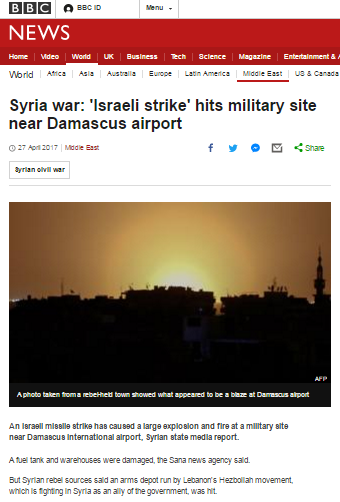As readers are no doubt aware on the evening of November 11th an Israeli Special Forces unit engaged in a covert operation east of Khan Younis in the Gaza Strip was exposed. In the ensuing firefight one Israeli officer was killed and another injured. Six members of Hamas and one member of the Popular Resistance Committees (PRC) were also killed. Later the same night terror factions in the Gaza Strip fired 17 projectiles at Israeli civilian communities in the Western Negev.
At around 16:30 the next day (November 12th) an Israeli soldier was injured when Hamas attacked an Israeli bus using a Kornet anti-tank missile. That was followed by an intense barrage of rocket and mortar attacks on Israeli communities with direct hits on homes and businesses in Ashkelon, Netivot, Sderot and at least three kibbutzim. One man was killed in Ashkelon and dozens were wounded. The attacks continued into the next day. Israel responded with some 150 strikes on targets belonging to terrorist factions in the Gaza Strip. Six fatalities were reported – at least four of whom were claimed by the PFLP and PIJ terror factions.
So how did BBC World Service radio’s flagship news and current affairs programme ‘Newshour‘ report those events and did that reporting adhere to the BBC’s editorial standards of accuracy and impartiality?
Listeners to the evening edition of ‘Newshour’ on November 11th heard a brief mention of the incident near Khan Younis in a news bulletin (from 25:25 here): [all emphasis in italics in the original, all emphasis in bold added]
“The Israeli army says it’s been involved in an exchange of fire with Hamas militants in Gaza. Media reports quoting Palestinian sources say at least 2 people, including a Hamas commander, were killed in the clashes.”
That incident was the lead story in the afternoon edition of ‘Newshour’ on November 12th which was titled “Gaza: Eight Killed in Covert Israeli Operation” with the synopsis telling BBC audiences that: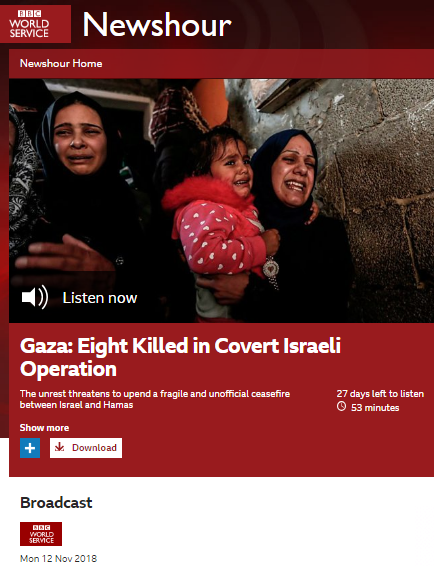
“A covert Israeli operation in the Gaza strip has killed seven Palestinians – including one Hamas military commander – and one Israeli soldier. The unrest threatens to upend a fragile and unofficial ceasefire between Israel and Hamas since March.”
(Image: Relatives of one of the seven Palestinians killed during an Israeli special forces operation in the Gaza Strip, mourn during his funeral. Credit: Getty Images)
Presenter Razia Iqbal introduced the item (from 00:11 here) as follows:
Iqbal: “We begin today with Gaza and Israel. There has been a fragile and unofficial ceasefire between Israel and Hamas in the wake of the bloodshed since March this year during protests by Palestinians at the border with Israel, dubbed by them as the Great Return March. More than 200 Palestinians have been killed by Israelis. On Sunday a covert Israeli operation in the Gaza Strip resulted in the deaths of seven Palestinians including one Hamas commander and one Israeli soldier – a Lieutenant Colonel. The subsequent firing of rockets into Israel from Gaza threatens to upend an uneasy peace. The prime minister Benjamin Netanyahu has returned from Armistice commemorations in Europe to meet with his security cabinet.”
In the rest of that item listeners heard from a man identified as Abu Amana – supposedly an eye-witness to the firefight near Khan Younis – before Iqbal conducted a long interview with Hamas spokesman Ghazi Hamad. As noted here previously, Iqbal once again failed to inform BBC audiences that all of the Palestinians killed in that incident were members of terror factions.
Iqbal: “But there was also a big significant loss on your side. Apart from the six other people who were killed, a senior Hamas commander, Nur Baraka.”
She likewise subsequently failed to challenge her Hamas interviewee’s claim that “they [Israel] killed seven civilians yesterday” or his claim that the Gaza Strip is ‘occupied’.
Iqbal’s final interviewee was Israeli MK Michael Oren to whom she put the claim that Israel had jeopardised the ‘ceasefire’ with a “botched” covert operation in the Gaza Strip.
The evening edition of ‘Newshour’ on the same day – November 12th – was titled “Violence Between Israel and Gaza Escalates” and yet again the webpage was illustrated using a photograph taken in Gaza.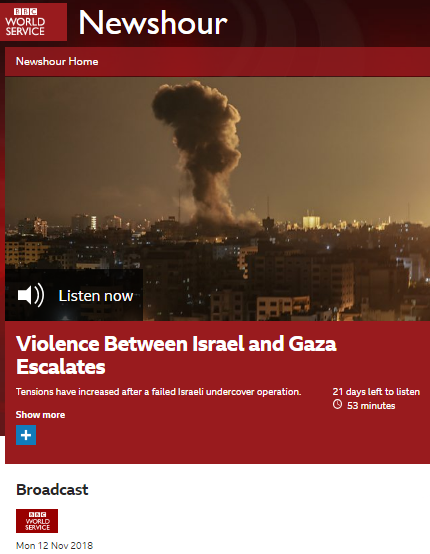
“Tensions have increased after a failed Israeli undercover operation. A mother of two young children tells us what it’s like living through the violence in the Gaza strip.”
(photo: Smoke rises after Israeli air strike in Gaza City, 12 November 2018 Credit: EPA/Mohammed Saber)
Presenter Tim Franks opened that lead story (from 01:17 here) as follows:
Franks: “The border between Israel and the Gaza Strip bristles with tension. It has done for years now and particularly in the decade or more that the Islamist Hamas movement has had control of the Palestinian territory. Frequently that tension erupts into violence – even outright war. As night has fallen in this part of the Middle East, there is a fear that events of the last 24 hours could presage another bloody upsurge. On Sunday an Israeli soldier and seven Palestinians – including a commander of Hamas’ paramilitary wing – were killed during an undercover Israeli operation deep inside the Gaza Strip. Since then scores of rockets – the Israeli army has just said 300 – have been fired from the Palestinian territory into southern Israel. The Israeli military for its part has carried out airstrikes – dozens of them – against targets inside the Gaza Strip.”
As we see, a full day after the incident near Khan Younis, listeners to ‘Newshour’ had still not been informed that all the Palestinians killed were members of terror groups.
Having failed to clarify to listeners that while that unattributed rocket fire targeted Israeli civilians, Israel’s airstrikes targeted the assets of terror factions, Franks went on to introduce his first interviewee, failing to challenge her description of the Gaza Strip as ‘occupied’, her inversion of rockets fired by terrorists as the result of Israeli counter-terrorism measures rather than their cause or even her claim that “Palestinians have tried peace”.
Franks: “First, a sense of life tonight in the Gaza Strip. Najla Shawa is an aid worker and mother of two young children who lives to the west of Gaza City.”
As noted here previously, part of that interview with Shawa was also aired on BBC Radio 4 on the same evening.
After that long and very sympathetic interview, listeners heard excerpts from the interviews with Ghazi Hamad and Michael Oren aired in the previous edition of the programme. Franks then quoted casualty figures provided by UNOCHA before introducing the Israeli journalist Anshell Pfeffer on the topic of ceasefire ‘negotiations’.
Towards the end of the programme (49:47) Franks spoke with the BBC’s Tom Bateman and listeners heard for the first time about the anti-tank missile attack on the Israeli bus, the fact that there had been direct hits on homes in some Israeli towns, the fact that Israel’s strikes were directed at “militant sites” and that two “militants” as they were dubbed by Bateman had been killed in the northern Gaza Strip.
In short, over 24 hours following the incident near Khan Younis and hours after the unprecedented barrage of missile attacks against Israeli civilians had commenced, ‘Newshour’ listeners had heard from two Gaza Strip residents, one Hamas spokesman (twice), one Israeli MK (twice) and one Israeli journalist. They had not however heard from any Israelis affected by the attacks. The programmes had repeatedly led listeners to believe that just one of the seven Palestinians killed in the incident near Khan Younis was a member of Hamas, while failing to clarify that in fact all were members of terrorist factions.
In part two of this post we will review the following day’s editions of ‘Newshour’.

